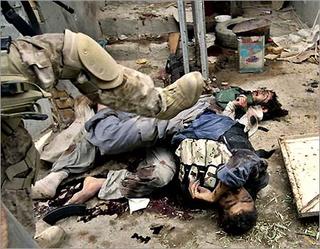The single similarity between the two is that they are (were) competing ideologies vying for dominance. Vietnam was relatively easy, because the ideologies underlying this conflict were essentially political. Iraq, however, will prove to be much more difficult, because the ideology underlying this conflict is wholly religious. In plain terms, this means we're not dealing with rationality, but the opposite. It is the re-emergence of an earlier struggle between cultures.
Vietnam:
 Background: This was an indirect, protracted (from about 1950 until 1975) clash between the U.S. and the U.S.S.R. Indochina became the unfortunate host to this conflict, with the U.S.S.R. sponsoring its client, Ho Chi Minh--by now thoroughly committed to his Russian patron--while the U.S. sponsored Ho's Catholic-based South Vietnam. It all started when President Eisenhower decided to accommodate the French, Indochina's former colonial master (and recently bloodied at Dien Bien Phu by Ho Chi Minh's determined guerrillas), and allow them to abandon their political mess and hand it to the U.S.A.
Background: This was an indirect, protracted (from about 1950 until 1975) clash between the U.S. and the U.S.S.R. Indochina became the unfortunate host to this conflict, with the U.S.S.R. sponsoring its client, Ho Chi Minh--by now thoroughly committed to his Russian patron--while the U.S. sponsored Ho's Catholic-based South Vietnam. It all started when President Eisenhower decided to accommodate the French, Indochina's former colonial master (and recently bloodied at Dien Bien Phu by Ho Chi Minh's determined guerrillas), and allow them to abandon their political mess and hand it to the U.S.A.By the time JFK took charge, history was already waiting for him to claim leadership of the "Democracy Camp"--dedicated to defeating the "Communist Camp," They were two clean, transparent ideologies no one had trouble understanding. That JFK was inclined to view Vietnam as more evidence of growing Soviet aggression, than as a rebellion by former French colonial subjects, was enhanced by his humiliation at the hands of Nikita Khrushchev, dictator of an increasingly xenophobic U.S.S.R . JFK agreed to meet the wily Communist thug at a "summit" in Vienna--a then-popular venue where chiefs of state were supposed to solve national differences mano a mano. But this summit turned out to be a huge photo-op and a contest of personalities; unfortunately for us, Khrushchev made a fool of the new, young, glitzy president, thus setting the tone for increasingly bolder Communist mischief in Berlin, Hungary, Czechoslovakia, East Germany, Cuba, Nicaragua, and of course, Vietnam. Thus, from the outset, JFK saw Vietnam as a challenge to his leadership in the struggle between Democracy and Communism.
From 1960 forward, there was no turning back. Things rapidly escalated. Conventional armies, supported by infiltrating guerrilla cadres, formed in the North. We built ours in the South--an unequal partnership between South Vietnam and us. Although there were occasional, brief confrontations between elements of the armies, the conflict dragged on in the form of frustrating "search and destroy" missions and competition with the Viet Cong guerrillas for the "hearts and minds" of the Vietnamese populous, under constant pressure from both sides.
I needn't rehash why we lost that miserable conflict--but we clearly lost it, primarily because we were fighting under a war doctrine that was emerging too slowly out of WWII (typically, generals always fight the last war--the one they remember best). It took us almost six years to figure out how to deal with a popular insurgency, nourished by the U.S.S.R., but during this hiatus the Left, their fellow travelers and a laissez-faire, dope-smoking youth culture (dubbed "Flower Children") found their irrational, shrill, collective voice.
Anti-American "peace" demonstrations, "peaceniks" shouting their mantras "Give Peace a Chance"--"Make Peace, not War"-- "Hey, hey, LBJ, how many babies did you kill today?"--not to forget Jane Fonda, Hollywood's most narcissistic starlette and her shameful treatment of our POWs in the Hanoi Hilton--the seamless daily drumbeat badly demoralized the country, caused LBJ not to run for another term, and finally caused the U.S. Congress to lose its nerve. On the cusp of finally getting it right militarily, Congress cut off military funding for the war in the early spring of 1975. It was over quickly.
Famous photographs recorded the American humiliation for the world to see. Panic as the General Giap's army marched unopposed into Saigon. Army helicopters evacuating people from the U.S. Embassy's roof to waiting Navy ships; hysterical Vietnamese employees and others being pushed away from the Embassy's gates. In a matter of hours, the Communists occupied our Embassy, secured Saigon (renamed it Ho Chi Minh City), executed the Vietnamese who had collaborated with Americans, and set in motion the "boat people" exodus. We did not leave Vietnam "with dignity" as President Nixon had promised (by now he had resigned)--we abandoned it and the friends we used in a shameful manner.
Conclusion: Although the 25-year long venture ended badly and left the U.S. to deal with the psychological "Vietnam Syndrome" for years afterward, there was no direct, long-lasting consequence for the country's essential culture and institutions.
Iraq:
 General: Iraq is a completely different event, with much more subtle and complex underpinnings. It undoubtedly will outlast the 25-year Vietnam conflict, and it well may span the remainder of this century! Not just because it's a war without the usual characteristics such as identifiable military units, uniforms, and defined battlefields. But mainly because this is turning out to be a cultural (read "religious") conflict, instead of the familiar political type, for which Clausewitz designed our now familiar military models.
General: Iraq is a completely different event, with much more subtle and complex underpinnings. It undoubtedly will outlast the 25-year Vietnam conflict, and it well may span the remainder of this century! Not just because it's a war without the usual characteristics such as identifiable military units, uniforms, and defined battlefields. But mainly because this is turning out to be a cultural (read "religious") conflict, instead of the familiar political type, for which Clausewitz designed our now familiar military models.Background: (The continuation of an ageless titanic struggle between two religious dogmas.) The two cultures once again pitted against each other are fairly described as "western style, religious based, democracy" against "Semitic style, religious based theocracy." Yes, there is a thread in history that helps us understand this: It goes back to the Middle Ages, when Mohammedanism, under the leadership of the Caliphs, rapidly and successfully expanded its military, cultural, and economic influence almost as far as transportation and communication logistics permitted. By the 8th Century, it had occupied Roman Africa, the Mediterranean littoral, including Egypt, Spain, regularly threatened Constantinople, and had even advanced to the gates of Rome and Vienna. This was Europe's "Dark Ages"and by about A.D. 1050, Mohammedanism had nearly swallowed Christianity (i.e. Catholicism). Christianity's supreme reaction, the Crusades (from A.D. 1095 to 1200), managed to recoup lost lands and push the Muslims back into the Arabian deserts. However, as some historians have pointed out, Mohammedanism receded only temporarily, simmering while waiting for another era in which to reassert itself. Some say (and I tend to agree) this era has arrived.
Some also say (and I tend to believe) that our forays into Iraq and Afghanistan (both well justified in my opinion) may have been the "fuse" on a time bomb that has been lying dormant, but slowly reaching critical mass, ever since the last Crusaders returned from the Holy Land. In other words, our adventures may be testimony to the "Law of Unintended Consequences."
Since history is still being written on the emerging conflict that could take titanic in proportion, unless I tried to play Nostradamus, there's very little to do, but watch history unfold. If history is a contributor to the shape of the follow-on epoch, then perhaps we ought to design our present actions in accordance with the present reality. But just what is that reality?
Reality seems to be elusive for many of us. It's why Ambrose Bierce, a frontier free-lance journalist, adventurer, and publisher, wrote at the turn of the century: "Endeavor to see things as they are, not as they ought to be." In order to do that, we have to cast aside all those artificialities we (especially Americans) have foolishly imposed on ourselves, which we call "Political Correctness." Should we seriously consider what Ambrose wrote about religion, which is the reality that may be behind the present upheaval: "Treat things divine with marked respect, and don't have anything to do with them." And finally, as if to stiffen the spines of the politically correct folks, he counseled, "Cultivate a taste for distasteful truths."
O.K., so let's try for a distasteful truth: What's really behind the conflict (whether President Bush and the neo-Cons knew it at the time of planning)? Religion. Christianity vs. Mohammedanism. You can couch it in any terms you wish, but that's the "distasteful truth." If you and I don't want to believe it easily, we do know the Muslims absolutely believe it. "Allah Ahkbar" ("God is Great") is the mantra chanted at each beheading, each outrage, and each Muslim's hostile act in Iraq, Afghanistan, the Philippines, Pakistan, East Timor, Sudan, and wherever else Muslims are organized. You can try and parse the ugly situation any way you see fit, but none of the results is accurate or satisfactory, until you begin to see it through the lenses of the Mohammedans.
So what should our tactics and strategy be? I'll leave that to those better equipped and specifically charged with answering that question. However, anyone trying to devise tactics in Iraq by comparing it to Vietnam must be booted out of the locker room, for they're hopelessly caught in a time warp--still trying to fight a war long passed.
Conclusion: Forging a successful long-range strategy will require astute, concerted global thinking and is critically dependent on our ability to recognize the underlying reality of this present conflict--Iraq is merely the opening gambit in a much wider. The question is: Are we, along with the rest of the non-Islamic world up to it?
The next hundred years should be interesting.

No comments:
Post a Comment